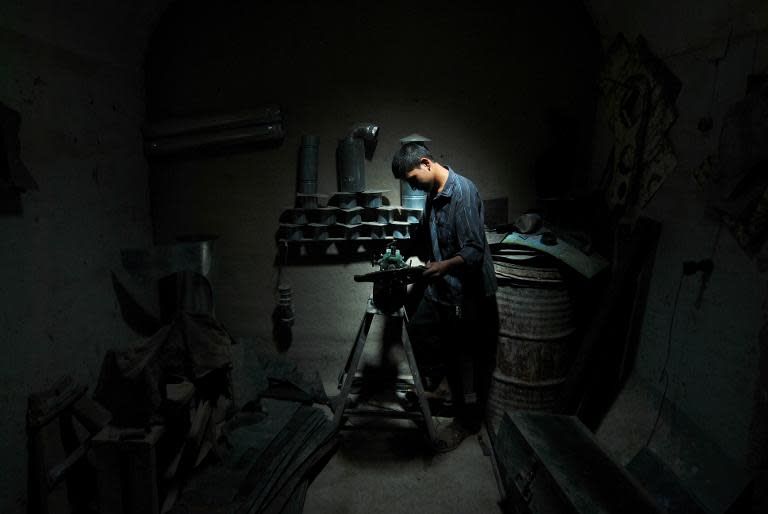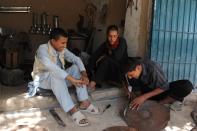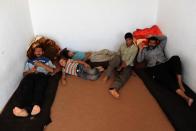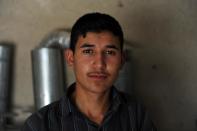Chance of a new life trumps risks for Afghan refugees
An elderly Afghan man with a bearded, tired face gazes from the television screen and says sadly: "My son wouldn't listen to me. He borrowed money just to pay for his death." The hard-hitting advert is part of a new campaign run by Afghanistan's refugee ministry to dissuade young men from using people smugglers to flee the war-torn country in search of a better life. Using real families' stories, the publicity drive aims to highlight how traffickers and treacherous journeys pose a deadly threat to migrants who often face deportation even if they reach their intended destination. The television clip shows the father, from the marginalised Hazara ethnic group, sitting in his shoe-repair stall remembering his son who tried to reach Australia. "I told him repeatedly not to go, not to trust the smugglers," he says as the camera closes in on his distraught eyes. "But he went and now he is dead, drowned at sea." Many Afghans are looking for an escape as more than a decade of international intervention winds down and fears grow that hardline Islamists or violent warlords will return to power. Ambitious young men are needed to help the country to develop, but the exodus has picked up pace as uncertainty deepens, NATO-led troops pull out in 2014 and aid money dries up. Afghans made 36,600 asylum claims in industrialised countries last year, according to the UN High Commissioner for Refugees (UNHCR), up from 36,200 in 2011. Even 12 years after the fall of the Taliban, Afghanistan remains the world's leading country of origin for refugees. Afghans often choose to head to Australia, Sweden, Germany or Norway, but they face a tough battle even if they complete epic overland journeys and sea passages in rickety smugglers' boats. In Australia, the new government came to power in September vowing to use its navy to tow the boats to back their place of origin -- typically Indonesia -- and its embassy in Kabul issues dire warning that migrants are not welcome. Those who do reach Christmas Island, an Australian territory in the Indian Ocean, are now processed and settled in under-developed Papua New Guinea. "Given the past experience of civil war and the Taliban rule, many Afghans feel pressured to flee the country at any cost," refugee ministry spokesman Islamudin Jurat told AFP. "Our campaign is intended at reversing the belief that leaving through illegal channels and putting your fate in the hands of traffickers carries little risk. "There is a real risk of death, and a little chance of reaching your destination safely and being accepted. "We have seen too many Afghan lives lost while trying to reach the shores of Europe and Australia, but traffickers see a golden opportunity to lure stressed Afghans into paying thousands of dollars." 'I am sure I would be happy and prosperous' The six-month campaign, which is backed by the International Organisation for Migration (IOM), is holding meetings in villages as well as airing TV and radio broadcasts, and distributing posters and leaflets. But it may struggle to convince people like Saber Rezayee, 20, an unemployed man from the northern city of Mazar-i-Sharif who has already made two failed attempts to reach Europe. "I prefer to go and die on the way than to stay here and be slaughtered by the Taliban, or blown up by bombs," he told AFP, recalling how he was deported from both Iran and Turkey as he tried to get to Sweden where he has relatives. "I am young, but I clearly remember the Taliban killing some relatives when they were in power. "Someone I know has opened a shop in Sweden. I am sure I would be happy and prosperous there." Migrants pay as much as $20,000 to smugglers who run routes out of Afghanistan using road transport or enable people to board flights with illegally obtained visas. Many heading to Australia fly first to Malaysia, then take one sea trip to Indonesia and another on overcrowded fishing boats to Christmas Island. The Australian government recorded two migrants who went overland to Pakistan, and then flew to Indonesia via Thailand, Hong Kong and Singapore, before making the final leg of the journey by boat. More than 600 people, including refugees from other countries such as Sri Lanka, are thought to have died making the sea journey to Christmas Island since 2006, though exact figures are not available. "They know the dangers and that they may be deported back but it is a good business," one smuggler who declined to give his name told AFP during an interview in Kabul. "We simply facilitate their escape. We take them mostly to Turkey, where some others will then take them to Europe and Australia." The IOM says many Afghan migrants have little idea of what they face when they pay smugglers and set off into the unknown. "Nobody can stop people wanting to move, but we want them to make a decision based on well-informed knowledge and correct information," Sato Mio, liason officer for the IOM, said. Fahim, a 36-year-old former government employee who declined to give his full name, said he was not put off by one failed effort to get to Germany via Tajikistan and Russia. "I can't imagine living in Afghanistan after 2014. I have already received threats from people who think me and my wife are too liberal to be good Muslims," he said. "I will sell my house soon and leave this country at any cost."











